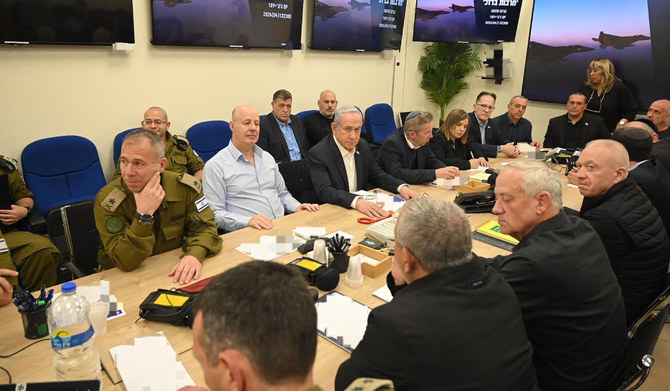JERUSALEM: A third meeting of Israel’s war cabinet set for Tuesday to decide on a response to Iran’s first-ever direct attack was put off until Wednesday, as Western allies eyed swift new sanctions against Tehran to help dissuade Israel from a major escalation.
Military chief of staff Herzi Halevi had promised that Saturday night’s launch of more than 300 missiles, cruise missiles and drones from Iran at Israeli territory “will be met with a response,” but gave no details.
While the attack caused no deaths and little damage thanks to the air defenses and countermeasures of Israel and its allies, it has increased fears that violence rooted in the six-month-old Gaza war is spreading, with the risk of open war between long-time adversaries Iran and Israel.
Iran launched the attack in retaliation for an airstrike on its embassy compound in Damascus on April 1 attributed to Israel, but has signalled that it now deems the matter closed.
An Israeli government source said the war cabinet session scheduled for Tuesday had been put off until Wednesday, without elaborating.
President Joe Biden told Israeli Prime Minister Benjamin Netanyahu at the weekend that the United States, Israel’s main protector, would not participate in an Israeli counter-strike.
Together with European allies, Washington instead strove on Tuesday to toughen economic and political sanctions against Iran in an attempt to steer Israel away from massive retaliation.
Israeli Foreign Minister Israel Katz said he was “leading a diplomatic attack,” writing to 32 countries to ask them to place sanctions on Iran’s missile program and follow Washington in proscribing its dominant military force, the Revolutionary Guard Corps, as a terrorist group.
Treasury Secretary Janet Yellen said the US would use sanctions, and work with allies, to keep disrupting Iran’s “malign and destabilising activity.”
She told a news conference in Washington that all options to disrupt Iran’s “terrorist financing” were on the table, and that she expected further sanctions against Iran to be announced in coming days.
European Union foreign policy chief Josep Borrell
, speaking in Brussels after an emergency video conference of EU foreign ministers, said some member states had asked for sanctions against Iran to be expanded and that the bloc’s diplomatic service would begin working on the proposal.
Borrell said the proposal would expand a sanctions regime that seeks to curb the supply of Iranian drones to Russia so that it would also include the provision of missiles and could also cover deliveries to Iranian proxies in the Middle East.
German Foreign Minister Annalena Baerbock said earlier on Tuesday that several EU members had promised to look again at extending sanctions, adding she would head to Israel within hours to discuss how to prevent an escalation.
’CALM HEADS’
British Prime Minister Rishi Sunak
told Netanyahu in a call on Tuesday that escalation in the Middle East was in nobody’s interest and would only worsen insecurity in the region, so it was “a moment for calm heads to prevail,” Sunak’s office said.
Sunak had said on Monday the Group of Seven major democracies was working on a package of measures against Iran. Italy, which has the G7 presidency, suggested any new sanctions would target individuals.
Iranian Deputy Foreign Minister Ali Bagheri Kani told state TV on Monday night that Tehran’s response to any Israeli counterattack would come in “a matter of seconds, as Iran will not wait for another 12 days to respond.”
The prospect of Israeli retaliation has alarmed many Iranians already enduring economic pain and tighter social and political controls since major protests in 2022-23.
Since the war in Gaza began in October, clashes have erupted between Israel and Iran-aligned groups based in Lebanon, Syria, Yemen and Iraq.
Israel said four of its soldiers were wounded hundreds of meters inside Lebanese territory overnight, the first known Israeli ground penetration into Lebanon since the Gaza war erupted, although it has regularly traded fire with the heavily armed Lebanese Hezbollah militia.
White House national security spokesman John Kirby declined on Monday to say whether Biden had urged Netanyahu in talks on Saturday night to exercise restraint in responding to Iran.
“We don’t want to see a war with Iran. We don’t want to see a regional conflict,” Kirby told a briefing.
Some analysts said the Biden administration was unlikely to seek to sharpen sanctions on Iran’s oil exports due to worries about a big spike in oil prices and angering top buyer China.
In a call between the Chinese and Iranian foreign ministers, China said it believed Iran could “handle the situation well and spare the region further turmoil” while safeguarding its sovereignty and dignity, according to Chinese state media.
Iran’s weekend attack caused modest damage in Israel and wounded a 7-year-old girl. Most missiles and drones were shot down by Israel’s Iron Dome defense system and with help from the US, Britain, France and Jordan.
In Gaza itself, where more than 33,000 Palestinians have been killed in the Israeli offensive according to Gaza health ministry figures, Iran’s action drew applause.
Israel began its campaign against Hamas, the Iranian-backed Palestinian militant group that runs Gaza, after the militants attacked Israel on Oct. 7, killing 1,200 people and taking 253 hostages, by Israeli tallies.
Iran’s attack prompted at least a dozen airlines to cancel or reroute flights, with Europe’s aviation regulator still advising caution in using Israeli and Iranian airspace.
















